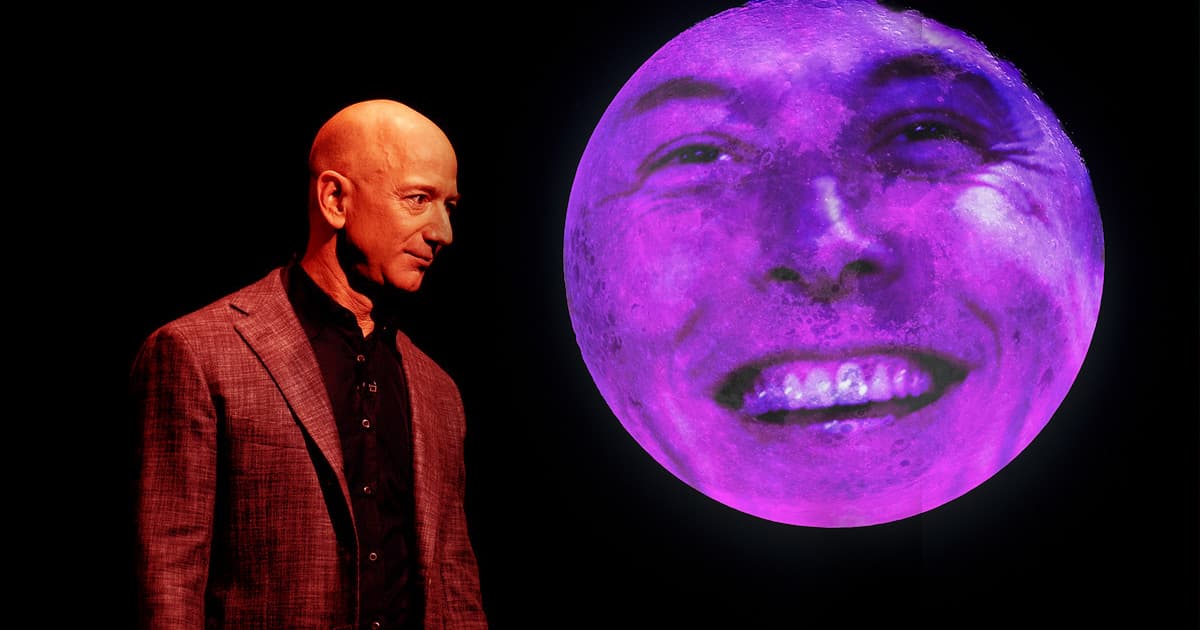Tesla and SpaceX CEO Elon Musk is making highly personal attacks against Amazon and Blue Origin founder — and fellow richest-person-in-the-world-club member — Jeff Bezos.
There's no love lost between the two billionaires, and now their space companies are in direct competition. Earlier this month, NASA announced that it was awarding SpaceX a highly-coveted contract to build a lander capable of touching down the first astronauts on the Moon since the Apollo missions as part of its Artemis program.
Left out in the rain was Blue Origin, Bezos' competing space company, which first revealed a lander concept back in 2019.
"Can’t get it up (to orbit) lol" Musk tweeted in response to a tweet by The New York Times' tech columnist Kenneth Chang, a dig that almost certainly appeared to be attacking Bezos' manhood.
According to Chang's report, Bezos' Blue Origin filed a 50-page protest with the federal Government Accountability Office on Monday, challenging the Human Landing Systems contract that NASA gave SpaceX.
Alabama-based defense contractor Dynetics, the third company competing with both Blue Origin and SpaceX to land the contract, also filed a protest.
According to Blue Origin CEO Bob Smith, NASA bungled its decision through flawed evaluations, placing too much emphasis on bottom-line cost.
"It’s really atypical for NASA to make these kinds of errors," Smith told the Times. "They’re generally quite good at acquisition, especially its flagship missions like returning America to the surface of the moon. We felt that these errors needed to be addressed and remedied."
Bezos' company decided to collaborate with well established aerospace companies Lockheed Martin and Northrop Grumman on its lunar lander design.
The resulting Blue Moon concept looked like something reminiscent of landers used during the Apollo missions half a century ago.
SpaceX, on the other hand, has taken a radically different approach. Rather than separating lander from descent and ascent vehicle, the company's Starship is an all-in-one solution, with the spacecraft being designed to be able to both land and take off from the Moon with astronauts and plenty of cargo on board.
After his tweet about Bezos' difficulty getting it up, Musk followed up with a crude image showing the Blue Moon lander with the words "Blue Balls" on the side.
So far, Blue Origin has managed to fly its New Shepard spacecraft to well above 100 kilometers in altitude, reaching the technical boundary of space. The company has also managed to softly land its vehicles following the launch.
New Shepard, however, isn't designed to go to the Moon. The company is hoping to use its much larger New Glenn rocket to first bring satellites into orbit before heading to the Moon — but the rocket's maiden voyage has repeatedly been pushed back and is now scheduled to launch some time next year.
Blue Origin recently chose to partner with the United Launch Alliance, using the Atlas V rocket to launch its own constellation of broadband-beaming satellites (themselves highly reminiscent of SpaceX's already-operational Starlink system) into orbit — not exactly a vote of confidence for its New Glenn platform.
Starship already has seen several full-scale test launches already, albeit with all four ending in massive explosions. SpaceX is hoping to go orbital some time later this year with the enormous spacecraft.
Thanks to budget squeezes from Congress, NASA made the difficult decision to chose just one winner for its Human Landing Systems contract. It was a highly controversial moment that saw a single company, SpaceX, winning out over both Dynetics and Blue Origin.
The blowback was immediate, with Texas representative Eddie Bernice Johnson (D-TX) saying that the decision was made "despite the obvious need for a re-baselining of NASA's lunar exploration program, which has no realistic chance of returning US astronauts to the Moon by 2024" in a statement.
Choosing just one company is also a blow to the spirit of competition, which will likely land NASA in even more hot water with Congress.
With a new NASA administrator, former astronaut and Democratic Senator Bill Nelson, being sworn in just days after the decision, the HLS contract will likely face future challenges and hurdles.
When asked during his confirmation if he would commit to adding competition to the agency's lander program, Nelson said that "I do," adding "competition is always good," as quoted by Ars Technica.
It's still unclear if NASA will consider signing contracts with SpaceX's competitors for developing future lunar landers.
"This is a demonstration of landing a crew on the surface of the Moon, and after that, there’s a lot of activity that can go on," Nelson said.
The new administrator's comments didn't satisfy everybody. Senator Maria Cantwell (D-WA), who has repeatedly advocated on behalf of Blue Origin in the past, argued that "there can’t be redundancy later; there has to be redundancy now."
It's a decisive moment in the country's plans to return American astronauts to the Moon. While SpaceX has made significant strides in developing its Starship platform, it isn't the only space company taking part in the race.
With a substantial head start over the competition, Musk is taking the moment to ridicule others' efforts to get us back to the Moon — behavior that doesn't, on its face, seem particularly productive.
READ MORE: Jeff Bezos’ Rocket Company Challenges NASA Over SpaceX Moon Lander Deal [The New York Times]
More on the contract: NASA Will Require SpaceX to Land Empty Starship on Moon Before Sending Astronauts
Share This Article
